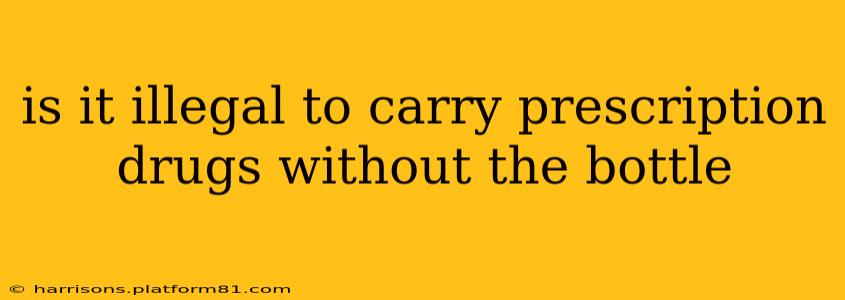Is It Illegal to Carry Prescription Drugs Without the Bottle?
Carrying prescription drugs without their original containers can land you in legal trouble, depending on several factors. While not inherently illegal in all situations, it significantly increases your risk of facing legal consequences. This article will explore the legality surrounding this issue, clarifying the ambiguities and highlighting potential pitfalls.
The Core Issue: Proof of Legitimate Possession
The primary concern isn't the lack of the bottle itself, but rather the inability to prove you legally possess the medication. The prescription bottle acts as crucial evidence confirming:
- The medication's identity: The label clearly identifies the drug, dosage, and prescribing physician. Without it, authorities might struggle to verify the medication's legitimacy, potentially mistaking it for an illicit substance.
- Your legal right to possess it: The label connects the medication to a specific prescription issued to you. This directly links your possession to a legitimate medical need.
- The prescription's validity: The label indicates the date the prescription was written and, in some cases, the expiration date. This verifies the prescription hasn't expired, making your possession lawful.
What Happens if You're Caught Without the Bottle?
The consequences of carrying prescription drugs without their original bottles vary greatly depending on several crucial factors:
- Jurisdiction: State and local laws differ significantly. Some jurisdictions might be more lenient, particularly if you can provide other verifiable proof of your prescription. Others might take a stricter approach, leading to fines, arrest, or even more serious charges depending on the medication.
- The Type of Drug: Controlled substances (e.g., opioids, benzodiazepines) attract far more scrutiny than non-controlled medications. The risk of legal repercussions increases dramatically with controlled substances.
- The Amount of Medication: Carrying a large quantity of medication without a bottle significantly raises suspicion. It raises questions about the legitimacy of possession and potentially points toward intent to distribute.
- Your Ability to Provide Proof: If you can provide a copy of your prescription, a doctor's note, or other credible evidence proving your right to possess the medication, it strengthens your defense.
- The Circumstances: Were you stopped at a routine traffic stop, or was this part of a larger investigation? The context surrounding the situation significantly impacts the likely outcome.
How to Avoid Legal Trouble
The simplest and safest way to avoid legal issues is to always carry your prescription medications in their original containers. However, if this isn't feasible, consider these steps to mitigate risk:
- Keep a photocopy of your prescription: Carry a copy of your prescription, ideally in a separate, easily accessible location from the medication.
- Inform authorities if stopped: If stopped by law enforcement, inform them immediately that you have prescription medication and offer to provide proof of its legitimate possession.
- Transfer medication into a pill organizer carefully: While using a pill organizer is often convenient, ensure it is labeled clearly with the medication name and dosage. Consider keeping the original prescription bottle as supplementary proof.
Is it Legal to Transfer Medication to Another Container?
Transferring your medications to a different container isn't illegal per se, but it significantly weakens your ability to prove legitimate possession. It's generally advised against, particularly for controlled substances. If you must transfer medication, ensure the new container is clearly labeled with the medication name, dosage, and your name.
What if My Prescription Bottle is Damaged or Lost?
If your prescription bottle is damaged or lost, contact your pharmacist immediately. They can often provide a replacement label or a new bottle for your remaining medication.
In conclusion, while carrying prescription drugs without their original bottles isn't illegal in every circumstance, it creates significant legal vulnerabilities. The safest approach is always to carry medications in their original containers. If this is impossible, taking steps to provide proof of a valid prescription and acting responsibly will help avoid potential legal complications. Remember that local laws vary, so consulting with a legal professional if you have questions is always recommended.
